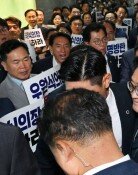Agreement Is Close for 10-year Extension of Levying Duties on Rice
Agreement Is Close for 10-year Extension of Levying Duties on Rice
Posted October. 31, 2004 23:08,
At negotiations with nine countries, including China and the United States, participants are reported to have almost agreed on a 10-year extension of levying customs duties on rice. With a couple of critical issues still to be resolved, the agreement is expected to be signed soon.
Yoon Jang-bae, director of international agriculture in the Ministry of Agriculture and Forestry, said yesterday, Counterparts including the United States, China and Thailand have practically agreed on the extension of imposing customs duties on rice in market.
Yoon also said, Issues remaining to be tackled are the period of extension, the amount of obligatory importation, and availability of sales in market. Next week when we finish a negotiation with China, we can provide overall outlines.
This can be interpreted that the participants in the negotiations have already agreed to the extension and are now working to narrow the gap on additional issues.
Regarding the 10-year extension of levying customs duties on rice, it is also under discussion that after five years, intermediary evaluations will be done to monitor the effect of the extension, and to decide to whether or not to continue the extension for five more years.
In addition, rice-exporting countries are, as conditions for the extension, calling for the increase in the amount of obligatory importation from 4 percent of the total of domestic rice consumption, which was available from 1986 to 1988, to 9 percent and permission for sales in the domestic market targeting households.
Complete agreement is likely to be achieved after Agriculture Minister Huh Sang-man, who is scheduled to leave for China next week, settles differences on the remaining issues in the negotiations with China.
The government plans to make the outcome of the negotiations public in the middle of the next month when the negotiations are expected to end, at which point public opinion will be solicited.
Yong Park parky@donga.com







